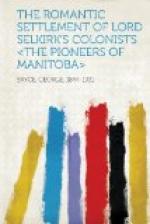EARLY RED RIVER CULTURE.
Strange as it may seem, the isolated Red River Colony was far from being an illiterate community. The presence of the officers of the Hudson’s Bay Company, the coming of the clergy of the different churches, who established schools, and the leisure for reading books supplied by the Red River Library produced a people whose speech was generally correct, and whose diction was largely modeled on standard books of literature. Mrs. Marion Bryce has made a sympathetic study of this subject, and we quote a number of her passages:
SCIENTIFIC WORK.
The duty laid upon the Hudson’s Bay Company officers and clerks of keeping for the benefit of their employers a diary recording everything at their posts that might make one day differ from another, or indeed that often made every day alike, cultivated among the officers of the fur trade the powers of observation that were frequently turned to scientific account, and we find some of them acting as corresponding members of the Smithsonian Institution in Washington. Valuable collections in natural history have been forwarded to the institution by such observers as the late Hon. Donald Gunn, the late Mr. Joseph Fortescue, and Mr. Roderick Ross Macfarlane.
Mr. William Barnston, a son of the Mr. Barnston, already mentioned, and a chief factor at Norway House, about 1854, was very fond of the cultivation of flowers and the study of botany, and some very valuable specimens of natural history in the British museum are said to have been of his procuring.
LIBRARIES.
Collections of books were a great means of providing knowledge and contributing to amusement in the isolated northern trading posts.
The Red River library had its headquarters in St. Andrew’s parish, and was for circulation in the Red River Settlement. It seems to have been chiefly maintained by donations of books by retired Hudson’s Bay Company officers and other settlers. The Council of Assiniboia once gave a donation of L50 sterling for the purchase of books to be added to the library. There was one characteristic of this library that it contained in its catalogue very few works of fiction.
LITERARY CLUBS.
In addition to libraries we find that at a later date in the history of the Settlement, literary clubs were formed. Bishop Anderson and his sister, who arrived in Red River in 1849, were instrumental in forming a reading club for mutual improvement, for which the leading magazines were ordered.
EDUCATION.
But we must now speak of more decided organization for the promotion of culture in Red River. The Selkirk settlers had now (1821) gained a footing in the land and the banks of the Red River had become the paradise of retired officers of the fur-trading companies. Happy families were growing up in the homes of the Settlement and education was necessary. A settled community made it possible for the churches and church societies in the homeland to do Christian work, both among the Indians and the white people, and to these institutions the Settlement was indebted for the first educational efforts made.




